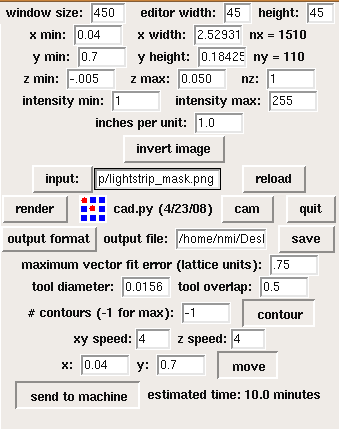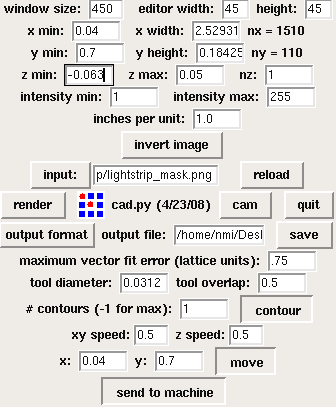How to use the Modela: Difference between revisions
Jump to navigation
Jump to search
No edit summary |
No edit summary |
||
| Line 12: | Line 12: | ||
# Click CAM | # Click CAM | ||
# Click Output format and choose .rml (Modela) | # Click Output format and choose .rml (Modela) | ||
# If you're using a circuit board written in Python, you'll find a line near the bottom saying "#dpi = 500 ". | # If you're using a circuit board written in Python, you'll find a line near the bottom saying "#dpi = 500 ". | ||
# Move the ("#") sign to the line above which is "dpi=200 | |||
* The "#" symbol is a comment, which will ignore the line of the command after the sign. | |||
* Use "dpi = 200 # low resolution for previewing" for previewing toolpath contour | |||
* Use "dpi = 500 # high resolution for machining" actual rendering and sending to Modela (takes longer to render) | |||
# Set contours to -1 (meaning infinite) | # Set contours to -1 (meaning infinite) | ||
# Click Contour | # Click Contour | ||
| Line 27: | Line 31: | ||
=== Milling a circuit === | === Milling a circuit === | ||
# Go to "view mode" by click on the view button on the Modela | |||
# Tape down copper board at o,o position ( 1 inch x 1 inch from bottom left corner) | |||
# Put 1/64 inches bit in the modela, which is 0.0156" decimal. Set it up as high as you can in the machine. Loosen existing bit with provided allen wrench. | |||
# Clear out the memory of the Modela, by holding the both ""up" and "Down on the machine | |||
# Open file in cad...follow instructions "Make a toolpath" | |||
# Set the x,y axis starting point on the project to 1, 1 on the control panel in cad and then click "move" | |||
# Lower bit close to the corner (1,1) by pressing the "Down" button. Be sure to not let the bit touch the surface. | |||
# Loosen the hex screw that holds the bit and lower it until it touches the top surface of the board. | |||
* Lower it slowly so the bit doesn't fall into the board and break. | |||
# Now that the bit is at surface level, tighten screw. | |||
# Open cad again and then send to machine. | |||
#* Þó ekki láta hana detta beint, slakaðu henni frekar niður þannig að hún brotni ekki | #* Þó ekki láta hana detta beint, slakaðu henni frekar niður þannig að hún brotni ekki | ||
#* Prófaðu að lyfta henni örlítið og sleppa til að vera viss um að ekkert sé fyrir | #* Prófaðu að lyfta henni örlítið og sleppa til að vera viss um að ekkert sé fyrir | ||
# Hertu skrúfuna fyrir fræsitönnina | # Hertu skrúfuna fyrir fræsitönnina | ||
#* Haltu kollettunni uppi og tönninni niðri meðan þú herðir svo hún verði ekki laus í. | #* Haltu kollettunni uppi og tönninni niðri meðan þú herðir svo hún verði ekki laus í. | ||
Revision as of 21:18, 24 June 2009

Step by step

- Design the circuit board
- Stick a piece of PCB stock onto the cutting plane
- Open Cad.py
- Click input and get a design file
Make the toolpath
- Make the toolpath for the circuit. Use a 1/64" tool, which is 0.0156" decimal.
- Click CAM
- Click Output format and choose .rml (Modela)
- If you're using a circuit board written in Python, you'll find a line near the bottom saying "#dpi = 500 ".
- Move the ("#") sign to the line above which is "dpi=200
* The "#" symbol is a comment, which will ignore the line of the command after the sign. * Use "dpi = 200 # low resolution for previewing" for previewing toolpath contour * Use "dpi = 500 # high resolution for machining" actual rendering and sending to Modela (takes longer to render)
- Set contours to -1 (meaning infinite)
- Click Contour
This will have it start making the toolpath.


Milling a circuit
- Go to "view mode" by click on the view button on the Modela
- Tape down copper board at o,o position ( 1 inch x 1 inch from bottom left corner)
- Put 1/64 inches bit in the modela, which is 0.0156" decimal. Set it up as high as you can in the machine. Loosen existing bit with provided allen wrench.
- Clear out the memory of the Modela, by holding the both ""up" and "Down on the machine
- Open file in cad...follow instructions "Make a toolpath"
- Set the x,y axis starting point on the project to 1, 1 on the control panel in cad and then click "move"
- Lower bit close to the corner (1,1) by pressing the "Down" button. Be sure to not let the bit touch the surface.
- Loosen the hex screw that holds the bit and lower it until it touches the top surface of the board.
- Lower it slowly so the bit doesn't fall into the board and break.
- Now that the bit is at surface level, tighten screw.
- Open cad again and then send to machine.
- Þó ekki láta hana detta beint, slakaðu henni frekar niður þannig að hún brotni ekki
- Prófaðu að lyfta henni örlítið og sleppa til að vera viss um að ekkert sé fyrir
- Hertu skrúfuna fyrir fræsitönnina
- Haltu kollettunni uppi og tönninni niðri meðan þú herðir svo hún verði ekki laus í.
- Sendu verkefnið á tækið. (Send to Machine)
- Þegar það er búið að fræsast, ýttu þá á View takkann.
Útskurður
- Búðu til skurðarbrautina fyrir rafrásina; notaðu möskvann sem á að skera eftir. Gættu þess að gera ráð fyrir 1/32" tönn.
- Settu 1/32" fræsitönn í fræsivélina,
- Fyllið inn í hugbúnaðinum í reitinn við Tool diameter: 0.0312
- Stillið Contours í hugbúnaðnum á 1.
- xy speed 0.5 og z speed 0.5.
- Í textaritlinum skal fjarlægja # fyrir framan cad.function = frame og # fyrir framan z = -.065skal fjarlægja "#" þar sem stendur:
#cad.function = pcb.interior #z = -.065
- Smellið á Contour í hugbúnaðnum
- Farðu úr View mode með því að smella á View takkann á fræsivélinni og stilltu núllpunkt á X og Y ás úr hugbúnaðinum með því að smella á Move. Notaðu nákvæmlega sama núllpunkt og áður!
- Haltu Down takkanum inni þar til að fræsihausinn færist niður að plötunni, ekki láta hana snerta
- Losaðu skrúfuna sem heldur fræsitönninni þannig að tönninn detti niður og snerti plötuna.
- Prófaðu að lyfta henni og sleppa til að vera viss um að ekkert sé fyrir
- Hertu skrúfuna fyrir fræsitönnina
- Sendu verkefnið á tækið.
Frágangur
- Taka agnir i burtu med t.d. ryksugu
- hreinsa rafrásarbrettið með því að skola það með vatni og sápu til þess að rásin tærist ekki með tímanum.
Ef eitthvað fer úrskeiðis
Ef eitthvað kemur upp á við fræsingu er hægt að smella á View takkann á fræsivélinni.
Til þess að hreinsa úr minni fræsivélarinnar er UP og DOWN tökkunum haldið inni í 5-6 sekúndur, halda tökkunum inni þar til Led ljós er hættir að blikka hjá VIEW takkanum..
Ef verkefni er sem hefur verið sent á úr cad.py er stöðvað þarf að slökkva á forritinu og byrja upp á nýtt. Þetta er t.d. hægt að gera með því að fara í Terminal í Linux og skrifa killall -9 python
Using Eagle
A nice tutorial about this was written by people at the Delhi Fab Lab. It should be uploaded.